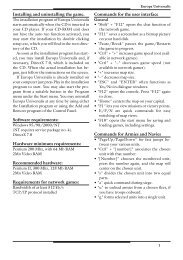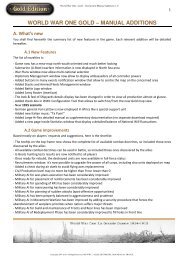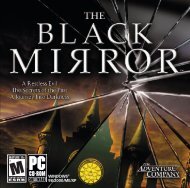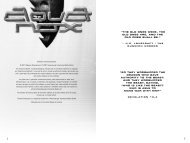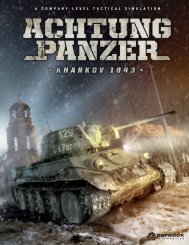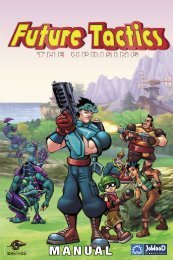You also want an ePaper? Increase the reach of your titles
YUMPU automatically turns print PDFs into web optimized ePapers that Google loves.
Enter in play: Military phase, any turn.<br />
Option #1: (historical choice) Surprise effect in battle – If the current battle<br />
is a naval encounter, the side playing this event receives a +1 die roll bonus<br />
to the Naval Surprise test (beware that this modifier can be modded). If it’s<br />
instead a land battle, the following bonuses are going to be applied. In<br />
Movement War, if the side playing this event is the defender, he inflicts a<br />
-3 penalty to the attackers combat die rolls (beware that this modifier can<br />
be modded); this penalty decreases by one point during each combat<br />
round, so becoming 0. On the other hand, the attacker gains no benefit if<br />
playing this event in Movement War. In Trench War, instead, both attacker<br />
and defender may benefit from the above mentioned bonus/penalty (for the<br />
attacker it’s a bonus to the die roll, for the defender it’s a penalty to the<br />
enemy’s die rolls). In addition, if played by the attacker, the defender may<br />
not bring any reinforcements during the first two combat rounds (exactly<br />
during the Flash Bombardments, but beware this bonus can be disabled by<br />
modding) and the attacker benefits from a +1 die roll bonus on the Flash<br />
Bombardments die rolls (also this one is moddable). If played by the<br />
defender, instead, the attacker suffers from a -1 penalty to the Preliminary<br />
Bombardments die rolls (also this one is moddable), whichever is the type<br />
of selected Preliminary Bombardment. Finally, the nation playing this event<br />
will benefit from a +2 bonus die roll modifier for all large river crossing tests<br />
(beware that this modifier can be modded)!<br />
Notes: once successfully in play, the event is discarded and can later be<br />
reshuffled in the deck. Two “Surprise” event cards are inside the deck.<br />
Breakthrough<br />
Description: This event will make any breakthrough surely successful,<br />
bringing also some outstanding bonus in the battle.<br />
Historical notes: Enemy lines have been broken and our troops spread fear<br />
and disorder among our foes. Seize your opportunity.<br />
Conditions: automatic.<br />
Difficulty: die roll 3+.<br />
Enter in play: Military phase, any turn.<br />
Option #1: (historical choice) Breakthrough – If your side wins the battle,<br />
unless an enemy fortress is present in the combat location, a limited<br />
breakthrough battle will take place, where the enemy forces will suffer from<br />
an encirclement (if in Movement warfare doctrine) or a combat value<br />
penalty and a trench reduction (if in Fire-Power warfare doctrine).<br />
Notes: once successfully in play, the event is discarded and can later<br />
be reshuffled in the deck. Two “Breakthrough” event cards are inside the<br />
deck.<br />
Fog<br />
Description: This event will give you a major bonus on combat strength and<br />
a great increase in gas terror effect.<br />
Historical notes: Hoping that it would be a decisive weapon, Germany<br />
utilized the most advanced chemical industry in the world to the production<br />
of poison gas, although it had been banned in the Hague Conventions of<br />
1899 and 1907. Although France was the first to use poison gas in World<br />
War One in August 1914, Germany was the first to make large scale use<br />
in January 1915. During the war, all major factions used agents of<br />
chemical warfare, which gave rise to an occasionally expressed view of<br />
World War I as “the chemist’s war”.<br />
Conditions: automatic.<br />
Difficulty: die roll 3+.<br />
Modifiers: +1 if the current meteo conditions are rain or snow.<br />
Enter in play: Military phase, any turn.<br />
Option #1: (historical choice) Fog on the battlefield – During the current<br />
battle, the attacker receives a +2 bonus to combat die rolls, and the terror<br />
effects on the defender’s troops are more devastating upon the first use of<br />
Chlorine Gas. Finally, the nation playing this event will benefit from a +2<br />
bonus die roll modifier for all large river crossing tests (beware that this<br />
modifier can be modded)!<br />
Notes: once successfully in play, the event is discarded and can later be<br />
reshuffled in the deck.<br />
Encircling<br />
Description: This event will increase strongly the chances of encircling your<br />
enemy. A successful encirclement will bring a major increase in the<br />
combat factor of your units!<br />
Historical notes: A force becomes particularly vulnerable when it is<br />
surrounded as it is unable to receive supply or reinforcement and will be<br />
subject to attack from all sides. If unable to breakout of the encirclement it<br />
could be forced to surrender or face annihilation. The pincer or double<br />
envelopment is considered to be the consummate military maneuver. The<br />
movement executed by Hannibal at the Battle of Cannae is viewed by<br />
historians as one of the finest examples.<br />
Conditions: automatic.<br />
Difficulty: die roll 2+.<br />
Modifiers: -2 when the Fire-Power doctrine is dominant, -1 if the Combined<br />
Doctrine is dominant.<br />
Enter in play: Military phase, any turn.<br />
Option #1: (historical choice) Enemy encircled – You will increase the<br />
enemy forces’ risk of becoming encircled. In case of a successful<br />
encirclement, your assaults will benefit from a large bonus!<br />
Notes: once successfully in play, the event is discarded and can later be<br />
reshuffled in the deck.<br />
World War One: La Grande Guerre 1914-1918 181



